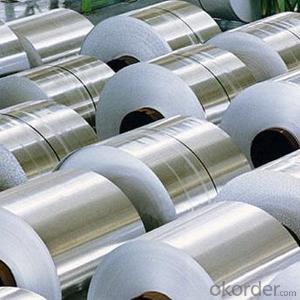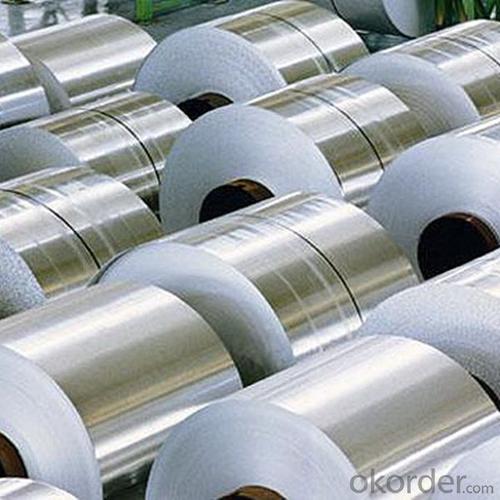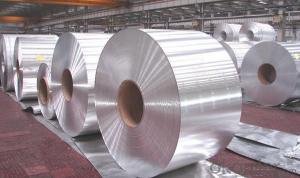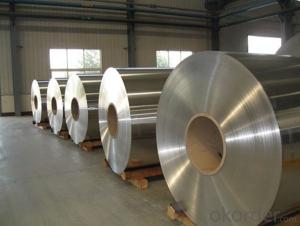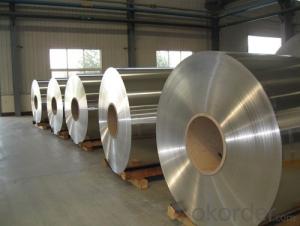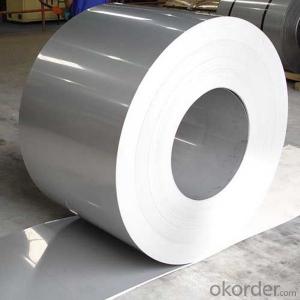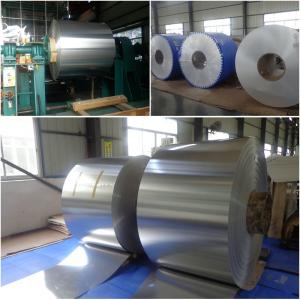Mill Finish Aluminum Roof Coil AA1200 H14 for Building
- Loading Port:
- Shanghai
- Payment Terms:
- TT OR LC
- Min Order Qty:
- 5 m.t.
- Supply Capability:
- 10000 m.t./month
OKorder Service Pledge
OKorder Financial Service
You Might Also Like
Specification
1. Specification of Mill Finish Aluminium Coil AA1200 H14 for Building
Name | Aluminum Coil |
Brand | CNBM |
Alloy | 1100H-18, 3003-H24,3003-H26,3005-H26,8011,3004,3105,5005,etc. |
Thickness | 0.1~1.5mm |
Width | <2000mm< span=""> |
MOQ | 1 MT |
Coating finish | Brushed, drawing, embossed, printing |
Color | As to code RAL |
Surface | Embossed,Mill Finish,Coated,Brushed |
Gloss | 10-90%(EN ISO-2813:1994) |
Total coating thick | PVDF27 ~35micron |
Polyester18~27micron(EN ISO-2360:1995) | |
Coating hardness | 2H |
Adhesion | 5B (EN ISO-2409:1994) |
Impact resistance | No cracking and peeling (A.S.T.M D2794-1993) |
Flexibility (T-bend) | 0T- 2T |
MEK resistance | 100 |
Certification | ISO9001:2000, CE, SGS |
Coil's standard diameter | 1100mm |
Inner Diameter | 405mm/505mm |
Coil's standard weight | 1MT - 2MT |
2. Application of Mill Finish Aluminium Coil AA1200 H14 for Building
(1).Interior: wall cladding, ceilings, bathrooms, kitchens and balconies, shutters, doors...
(2).Exterior: wall cladding, facades, roofing, canopies, tunnels,column covers , renovations...
(3).Advertisement: display platforms, signboards, fascia, shop fronts...
3. Feature of Mill Finish Aluminium Coil AA1200 H14 for Building
*Such coil is specially designed to replace aluminum ingot, due to the high export tax of aluminum ingot, the coil has better price than ingot.
*This type of coil can fit customer's remelting furnace just like ingot, no need to make any change to the production line that was previously used for ingot. The standard coil size and weight is very suitable for the feed gate of furnace.
*This type of coil causes less material wastage than ingot when remelted.
*Our coil is made directly from ore, no need to go though the ingot making process, quality is much better than other suppliers who use ingot scrap to make coil.
Be free from Oil Stain, Dent, Inclusion, Scratches, Stain, Oxide Dicoloration, Breaks, Corrosion, Roll Marks, Dirt Streaks and other defect which will interfere with use
4. Certificate:
SGS and ROHS(if client request, paid by client), MTC(plant provided), Certificate of Origin(FORM A, FORM E, CO), Bureau Veritas and SGS (if client request, paid by client), CIQS certificate
5. Image of Mill Finish Aluminium Coil AA1200 H14 for Building
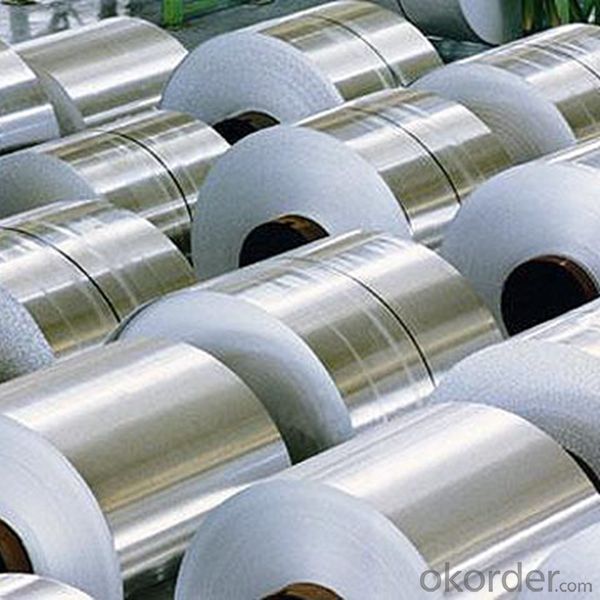
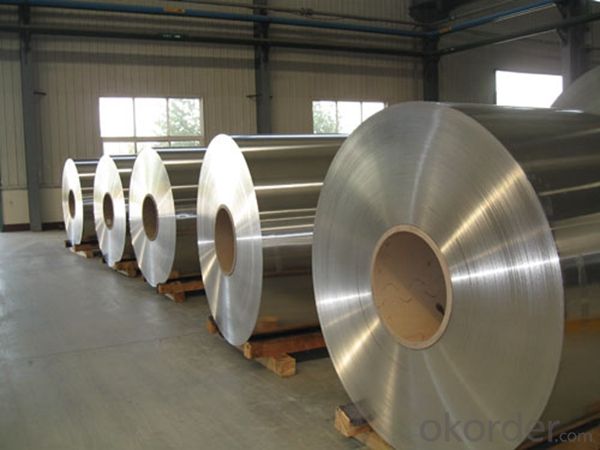
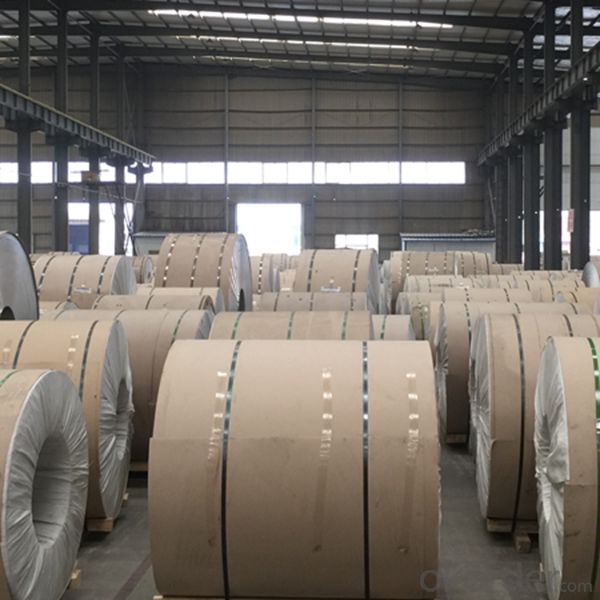
6. Package and shipping of Mill Finish Aluminium Coil AA1200 H14 for Building
eye to wall
eye to the wall
with wood pallet (wooded case also available)
7. FAQ
1) What is the delivery time?
Dpends on actual order, around 20 to 35 days
2)What is the QC system:
We have QC staff of 20 persons and advanced equipment, each production is with MTC traced from Aluminum ingot lot.
3) What market do you mainly sell to?
Australia, America, Asia, Middle East, Western Europe, Africa etc
- Q: I want to paint my cars rims and grill metallic pink. But supposedly paint doesn't stick well to aluminum. What can I do to make it stick better and not chip?
- make sure the aluminum is ruffed up with at least 800 grit sand paper after that clean well and make sure is is dry after you clean after that use a product called adhesion promoter it will help the paint stick to the wheel hope this helps
- Q: is Aluminum wrotten with a 2 behnd it?
- Are you asking if it's a diatomic molecule? Because then the answer would be no. Aluminum is a metal. The only diatomic molecules are Hydrogen, Nitrogen, Oxygen, Chlorine, Flourine, Bromine and Iodine. And even those are only written when they are by themselve and not part of a chemical compound.
- Q: What is the hardness of aluminum coils?
- The hardness of aluminum coils can vary depending on factors such as the alloy used and the specific manufacturing process. However, in general, aluminum coils are known for their relatively low hardness compared to other metals.
- Q: What is the typical coefficient of thermal expansion for aluminum coils?
- The typical coefficient of thermal expansion for aluminum coils is approximately 23 x 10^-6 per degree Celsius. This means that for every degree Celsius increase in temperature, the length of the aluminum coil will expand by 23 parts per million. The coefficient of thermal expansion is an important factor to consider when designing and working with aluminum coils, as it affects their dimensional stability and can cause thermal stresses in the material when exposed to temperature changes.
- Q: The general roll also 5,6t appearance, specific to your own weigh, length, weight = / (width * thickness * density)
- The general roll also 5,6t appearance, specific to your own weigh, length, weight = / (width * thickness * density)
- Q: How are aluminum coils tested for quality?
- Aluminum coils are tested for quality using a variety of methods to ensure they meet the required standards. One of the commonly used tests is the visual inspection, where trained personnel examine the coils for any visual defects such as scratches, dents, or surface imperfections. Another important test is the dimensional inspection, which involves measuring the thickness, width, and length of the coils using precision instruments. This ensures that the coils are manufactured within the specified tolerances. Additionally, mechanical tests are conducted to assess the strength and durability of the aluminum coils. These tests include tensile and yield strength tests, which measure the maximum load a coil can withstand before breaking or deforming. Bend tests are also performed to evaluate the flexibility and resistance to cracking. Furthermore, chemical composition analysis is conducted to verify the purity and consistency of the aluminum material. This is typically done using spectroscopy techniques, such as atomic absorption or emission spectroscopy, to determine the exact elemental composition of the coils. Surface coating tests are also carried out to assess the quality of any protective or decorative coatings applied to the aluminum coils. These tests include adhesion testing, corrosion resistance testing, and color consistency evaluation. In addition to these traditional tests, advanced non-destructive testing methods are employed to detect any internal defects or flaws in the coils. Techniques like ultrasonic testing, eddy current testing, or X-ray inspection are used to identify any hidden defects without damaging the material. Overall, a combination of visual, dimensional, mechanical, chemical, and non-destructive tests ensures that aluminum coils meet the required quality standards before they are used in various applications such as construction, automotive, or electronics industries.
- Q: wikipedia says welding aluminum by means of stick welding is possible but i have always been told TIG is the only way to weld aluminum. what do i need in order to stick weld aluminum? BTW i have a Lincoln Electric AC 225 Stick Welder
- you can weld aluminum with stick, tig, or mig processes. We use mig to weld aluminum bus sections for power houses. I agree that stick is a difficult way to weld aluminum and the results are often less than desirable. Look into renting a mig machine and getting the proper gas and wire.
- Q: Can aluminum coils be used in the aerospace industry?
- Yes, aluminum coils can be used in the aerospace industry. Aluminum is widely used in the aerospace industry due to its desirable properties such as low density, high strength-to-weight ratio, and excellent corrosion resistance. Aluminum coils are often used in the manufacturing of various aircraft components such as fuselage panels, wings, and structural frameworks. The coils can be easily formed into different shapes and sizes, providing flexibility in design and reducing the overall weight of the aircraft. Additionally, aluminum coils are compatible with different manufacturing processes like welding, machining, and forming, making them an ideal choice for the aerospace industry.
- Q: Who knows about how much money can be sold in a three metre high similar aluminum door?
- How wide is it, mainly to see the door you have multiple components, scrap is generally about 10 yuan a kilogram!
- Q: What are the insulation options available for aluminum coils?
- There are several insulation options available for aluminum coils, depending on the specific requirements and applications. Some common insulation options include: 1. Foam Insulation: Foam insulation is a popular choice for aluminum coils as it provides excellent thermal insulation properties. It is available in various forms, such as rigid foam boards or flexible foam sheets, and can be easily cut and fitted around the coils. 2. Fiberglass Insulation: Fiberglass insulation is another commonly used option for aluminum coil insulation. It consists of thin glass fibers that are woven together to create a blanket-like material. Fiberglass insulation is lightweight, easy to install, and offers good thermal and acoustic insulation. 3. Mineral Wool Insulation: Mineral wool insulation is made from natural or synthetic minerals, such as rock or slag, that are melted and spun into fine fibers. It is known for its excellent fire-resistance properties and provides effective thermal insulation for aluminum coils. 4. Reflective Insulation: Reflective insulation is designed to reflect radiant heat away from the aluminum coils. It typically consists of a layer of aluminum foil laminated to a layer of fiberglass or plastic bubble wrap. Reflective insulation is particularly effective in warmer climates where reducing heat gain is a priority. 5. Vapor Barrier Insulation: Vapor barrier insulation is used to prevent the transfer of moisture through the insulation material. It is often applied as a coating or film over the insulation to create a barrier against water vapor, reducing the risk of condensation buildup on the aluminum coils. It is important to consider factors such as thermal conductivity, fire resistance, moisture resistance, and installation requirements when selecting the appropriate insulation option for aluminum coils. Consulting with a professional or referring to manufacturer guidelines can help in determining the most suitable insulation option for specific coil applications.
Send your message to us
Mill Finish Aluminum Roof Coil AA1200 H14 for Building
- Loading Port:
- Shanghai
- Payment Terms:
- TT OR LC
- Min Order Qty:
- 5 m.t.
- Supply Capability:
- 10000 m.t./month
OKorder Service Pledge
OKorder Financial Service
Similar products
Hot products
Hot Searches
Related keywords
